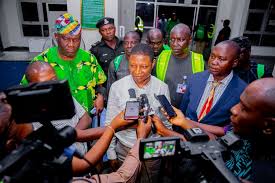The Senate Wednesday, resolved that a new law be enacted to mandate the Independent National Electoral Commission (INEC) to use new technologies in the accreditation and electronic voting by voters during elections.
This was contained in a bill for an Act to amend the Electoral Act, 2010 and for other related matters 2019 which passed second reading in Senate.
The bill is sponsored by the Deputy President of the Senate, Senator Ovie Omo-Agege (APC Delta Central) and Senator Abubakar Kyari (APC Borno North), who incidentally , chairs the Senate Committee on INEC.
In his lead debate on the bill, Omo-Agege explained that because the National Assembly has a constitutional gatekeeping role for democracy, it was all-important to protect constitutional order by ensuring elections are free, fair and credible.
He said to achieve the mandate, the nation’s electoral laws must be sound and up to date in order to respond adequately to new challenges that come with changing times and human behaviours.
According to him, the bill is a response in part to a plethora of Supreme Court decisions that directly called upon the National Assembly to act by enacting laws formalising INECs introduction of modern technologies into the electoral process, especially accreditation of voters.
The Bill if finally passed into law, seeks to ensure that “the Act clearly forbids members of political parties from taking up employment in INEC; mandate INEC to publish the Voters Register for public scrutiny at every Registration Area and on its website at least seven (7) days before a general election;
“Mandate INEC to suspend an election in order to allow a political party that lost its candidate before or during an election to conduct a fresh primary to elect a replacement or new candidate; grant agents of political parties the right to inspect original electoral materials before the commencement of an election;
“Grant political parties that nominated candidates for an election a right (exercisable within a specified timeframe) to inspect its identity/logo appearing on samples of relevant electoral materials proposed to avoid incessant cancellation of elections due to exclusionof parties from election due to printerserrors or deliberate mischief of not including the logos of some parties on electoral materials;
“Clearly mandate INEC to accommodate new technologies in the accreditation of voters during elections, as repeatedly called for the Supreme Court; define overvotingto include situations where total votes castalso exceed total number of accredited voters;
“Provide greater clarity and transparency in the process of reaching the final announcement of election results, starting with sorting of ballots, counting of votes, etc; mandate INEC to record and keep relevant detailed information of results sheets, ballot papers and other sensitive electoral materials used in an election, with clear consequences for violation;
“Enact a new Section 87 on Nomination of Candidates by Parties for Electionsby prescribing maximum fees payable by aspirants and restricting nomination criteria strictly to relevant provisions of the Constitution; and clarify that under Section 138 (1)(a) of the Principal Act, a person shall be deemed to be qualified for an elective office and his election shall not be questioned on
grounds of qualification if, with respect to the particular election in question, he meets the applicable requirements of sections 65, 106, 131 or 177 of the Constitution of the Federal Republic of Nigeria, 1999 (as amended) and he is not, as may be applicable, in breach of sections 66, 107, 137 or 182 of the Constitution of the Federal Republic of Nigeria, 1999;
“Provide sanctions for giving false information for purpose of registering a political party and ensure that failure by INEC and others to comply with any provision of the Act carries clear and adequate sanctions”
Omo-Agege explained further that the Bill has 26 clauses and that in compliance with Order 77(3) of the Senate Standing Rules, the Bill has no financial implications.



